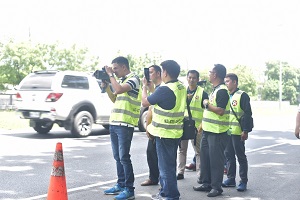
Excessive and inappropriate speed is one of the most important factors contributing to road fatalities and injuries in many countries. For the Philippines, the WHO Global Status Report on Road Safety 2018 rated national speed limit law enforcement at only 5 out of 10, indicating a critical gap and highlighting an opportunity for targeted efforts.
According to WHO data, 12.3 per 100,000 people die from road crashes in the Philippines. While this is lower than the average for the Western Pacific Region of 16.9 deaths per 100,000 population, and at a similar level to countries like USA (12.4 per 100,000) or Chile (12.5 per 100,000), the country is stepping up measures to improve its road safety situation.
Reducing speeding has been a focus of action by the Government of the Philippines to strengthen road safety laws. A 2018 Joint Memorandum Circular issued for nation-wide implementation to promote the ability of Local Government Units to set speed limits on all roads and to establish coordination mechanisms between the Government and Local Government Units (LGUs).
However, a legal and institutional assessment supported by Global Road Safety Partnership highlighted that most of the 229 LGUs interviewed (representing provinces, cities and first-class municipalities) remain unaware of their responsibilities to classify roads in order to set appropriate speed limits and to procure and utilize adequate speed detection devices. In addition, most LGUs lack the technical expertise to manage the process of classifying roads, setting appropriate speed limits and enforcement of said speed limits.
The UN Road Safety Fund is supporting concrete action to address this situation through a speed management project, establishing and building the capacities of a core group of law enforcement personnel from different agencies who will provide practical speed enforcement training at the district level.
The training sessions have already reached more than 150 enforcers since they started in May 2019. This month, a second training-of-trainers will be conducted, to be followed by a high-level meeting to help the Land Transportation Office and other law enforcement agencies craft a national speed enforcement plan.
Financed by the UN Road Safety Fund as one of its 5 pilot projects in 8 countries, the project is executed by UNESCAP in partnership with GRSP and in cooperation with the Land Transportation Office and the Department of Transportation of the Philippine Government, as well as a non-government organization, ImagineLaw.
The training was designed on the basis of a capacity assessment exercise of law enforcement agencies. Participants received best practices on speed enforcement principles, deterrence-based methods, traffic policing, the use of different speed measurement devices, and practical recommendations to conduct effective speed enforcement operations. The training also included a hands-on session in real traffic situations to collect measurements using speed measurement devices at the roadside. Selected participants also received direct coaching from GRSP experts.
Safe behaviour on the roads and proper enforcement are fundamental components of well-functioning road safety systems. The UN Road Safety Fund takes a holistic approach to strengthening these systems, working with countries and partners to address key gaps.
Learn more at: http://www.unece.org/unrsf/home.html